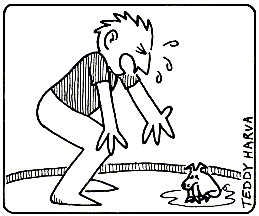 There were a number of Australian
fans at Confiction, but unfortunately, the author of the following (which we received
in the mail shortly before we left for Europe) wasn't among them. When people ask us
"What kind of article do we run in Mimosa?" we've always said first-person
articles about Things Fans Do. And while we think Mimosa is a pretty good
fannish production, the following essay is about an even better fannish
production... There were a number of Australian
fans at Confiction, but unfortunately, the author of the following (which we received
in the mail shortly before we left for Europe) wasn't among them. When people ask us
"What kind of article do we run in Mimosa?" we've always said first-person
articles about Things Fans Do. And while we think Mimosa is a pretty good
fannish production, the following essay is about an even better fannish
production...

 What a hospitable soul a baby is!
Always happy to see you, always sorry when you go, even to the extent of loud
lamentations. Very loud lamentations. Even at four in the morning.
Especially at four in the morning, dammit. What a hospitable soul a baby is!
Always happy to see you, always sorry when you go, even to the extent of loud
lamentations. Very loud lamentations. Even at four in the morning.
Especially at four in the morning, dammit.

 The long watches of the night are
said to be ideal for composing the soul to philosophical contemplation, or to poetry.
Certainly the current circumstances make it unlikely that the soul can be composed
to sleep. Why, he's only just getting into his full stride now, and hardly rattling
the windows at all yet. I suppose, though, that I could have a go at some poetry.
Philosophy is a little beyond me, I'm afraid, as well as being out of my line. And
beyond philosophy (some would say, within it) lies madness. Though madness, to be
sure, begins to look deuced attractive, some of these nights. The long watches of the night are
said to be ideal for composing the soul to philosophical contemplation, or to poetry.
Certainly the current circumstances make it unlikely that the soul can be composed
to sleep. Why, he's only just getting into his full stride now, and hardly rattling
the windows at all yet. I suppose, though, that I could have a go at some poetry.
Philosophy is a little beyond me, I'm afraid, as well as being out of my line. And
beyond philosophy (some would say, within it) lies madness. Though madness, to be
sure, begins to look deuced attractive, some of these nights.

 Verses, now. I should start with
something simple. A clerihew, perhaps: Verses, now. I should start with
something simple. A clerihew, perhaps:

Evan John Luckett Beasley
As I'll admit, uneasley,
Is plagued with looseness of the bowels.
He also Howels.
|

 Or a limerick: Or a limerick:

The soldiers were greatly admirin'
Evan's voice, though it drowned out the firin'
 "Just imagine!" they said. "Just imagine!" they said.
 "He could waken the dead "He could waken the dead
"From an air-raid, and act as the siren!"
|

 Um. Not quite what I had in mind.
Perhaps something subtle and oriental, like a haiku: Um. Not quite what I had in mind.
Perhaps something subtle and oriental, like a haiku:

Evan sits, grunting.
Does he regress to piglet,
Or fertilise floor?

|

 About as subtle as a brick enema, as
my old mate Ian Nichols says. Well, a villanelle is supposed to be delicate and
frenchified: About as subtle as a brick enema, as
my old mate Ian Nichols says. Well, a villanelle is supposed to be delicate and
frenchified:

Just when you'd think he'd have to quit --
Your wise precautions seem quite sound --
 He thinks of ways to manage it, He thinks of ways to manage it,
To fit where nothing else could fit
And pull the curtains to the ground,
 Just when you'd think he'd have to quit. Just when you'd think he'd have to quit.
You put him on the ground to sit
A moment -- then he can't be found.
 He thinks of ways to manage it. He thinks of ways to manage it.
The crash of glass! Another's hit!

He's teleporting, I'll be bound.
 Just when you'd think he'd have to quit, Just when you'd think he'd have to quit,
Could never reach the notes you've writ
You'll find them shredded, wadded, ground --
 He thinks of ways to manage it. He thinks of ways to manage it.
And when you think, "That must be it;
"The day's foul nappies form a mound!"
 Just when you'd think he'd have to
quit, Just when you'd think he'd have to
quit,
 He thinks of ways to manage it. He thinks of ways to manage it.
|

 Hmm. I'd say that that particular
piece is to delicacy as Attila the Hun is to court etiquette. Hmm. I'd say that that particular
piece is to delicacy as Attila the Hun is to court etiquette.

 Have you ever noticed that the things
you write seem to take on a disgusting life of their own, a Frankenstein's creation
starting up from the table, to the horror of the helpless progenitor? I really
didn't mean to allude to the more revolting aspects of infant care in that one, but
it somehow slipped out, like (as my old mate Nichols says, again) a -- no, I don't
think I'd better say what my old mate Nichols says it slipped out like. You get the
general idea. But what observation applies most especially to the stricter form
verse that I prefer to write -- which I write only, I hasten to add, out of sheer
perversity and a mulish intolerance of what everyone else has been doing for the
last century or so. Have you ever noticed that the things
you write seem to take on a disgusting life of their own, a Frankenstein's creation
starting up from the table, to the horror of the helpless progenitor? I really
didn't mean to allude to the more revolting aspects of infant care in that one, but
it somehow slipped out, like (as my old mate Nichols says, again) a -- no, I don't
think I'd better say what my old mate Nichols says it slipped out like. You get the
general idea. But what observation applies most especially to the stricter form
verse that I prefer to write -- which I write only, I hasten to add, out of sheer
perversity and a mulish intolerance of what everyone else has been doing for the
last century or so.

 Nevertheless, I'll stick with it, but
try for something a little more stately. Formal. Like a ballade: Nevertheless, I'll stick with it, but
try for something a little more stately. Formal. Like a ballade:

The Ballade of Infant Moisture

In changing of his nappy, yesterday,
I mustn't have been watching what I'd done,
Or, more specifically, observed the way
His little pistol pointed. I'd have run,
But had no time or hope. I had but one
Swift, frozen moment, standing with teeth clenched
While staring down the barrel of the gun --
 That was the way we both were
slightly drenched. That was the way we both were
slightly drenched.

And later, on my knees he liked to play
And bounce about, and writhe and bend. At one,
Just after he had had his dejeuner
(And half my modest meal of tea and bun)
Right in the middle of a bounce, my son
A tribute from his inmost corpus wrenched.
'Twas warm, from near the heart (a dreadful pun).
That was the way we both were slightly drenched.

His bathtime -- happy closure of the day
A time of joy, and merriment, and fun.
It's not surprising that he'd wish to stay,
And make that time continue, once begun.
I sympathise with his desire to shun
The biting air, when warmly, well-entrenched --

But still, I wish he hadn't kicked and spun,
 That was the way we both were
slightly drenched. That was the way we both were
slightly drenched.

Envoi

Prince, when holding him, as you do now, there's none
So eager that their ardour is not quenched
By varied means. Oh, dear! What has he done?
 That was the way we both were
slightly drenched. That was the way we both were
slightly drenched.

|

 I have to confess that I did that
deliberately. It was mainly an experiment, to see if I could emulate one of the
most remarkable feats of Hillaire Belloc (a poet I greatly admire, though much
neglected now), and write light verse in so strict a form as that. But for my next
trick, I'll try a rondeau: I have to confess that I did that
deliberately. It was mainly an experiment, to see if I could emulate one of the
most remarkable feats of Hillaire Belloc (a poet I greatly admire, though much
neglected now), and write light verse in so strict a form as that. But for my next
trick, I'll try a rondeau:

He will not stop. He has two speeds, flat out
And sleeping, moving even then, to flout
The laws of physics, for he should not be
Perpetually moving. Verily
He will not stop.

He eats just like a little bird -- about
Three times his weight, in food a day. No doubt
His intake slows, at times, but normally
He will not stop.

He's growing, too, in every way, without
A pause. Stronger, surer, up and out,
Forever further on. A day there'll be
When, joyful, he will run ahead, with me
Behind, and labouring. Then, "Stop!" I'll shout.
He will not stop.
|

 Oh well, if you're going to go all
serious on me, have a sonnet instead: Oh well, if you're going to go all
serious on me, have a sonnet instead:

There's nothing reasonable about this fate:
A dancing bear attending on this -- what?
This scrap of self-directed flesh, this clot
Of raw desire and shapeless will in spate.
How can I know what processes dictate
The things he wants, the things that he does not,
When he himself knows less, nor cares a jot
Who lives in that eternal-present state?

A section through eternity, indeed --
The ardent moment's set and frozen, still
As time is, in the mind of God. The need
Of that unending now, is law until
The galaxies are burned away and dead --
Or one hair turns upon his haloed head.
|

Or, if the insanity of writing this strict-form verse has finally burst all bounds,
there remains the nastiest one of all, the triolet:

Imperative, that music in the bone
A life to life must call. Unending
Sounds the call, the echoes blending.
Imperative, that music. In the bone,
The deepest core, that need is sending
Summonses to me that I must own
Imperative. That music in the bone
A life to life must call, unending.
|

 Nope. It's no good. He's awake
again. So, for that matter, am I. And the dawn, if not coming out of China, looks
a lot like thunder. So, for that matter, do I. Nope. It's no good. He's awake
again. So, for that matter, am I. And the dawn, if not coming out of China, looks
a lot like thunder. So, for that matter, do I.

All illustrations by Teddy Harvia
|